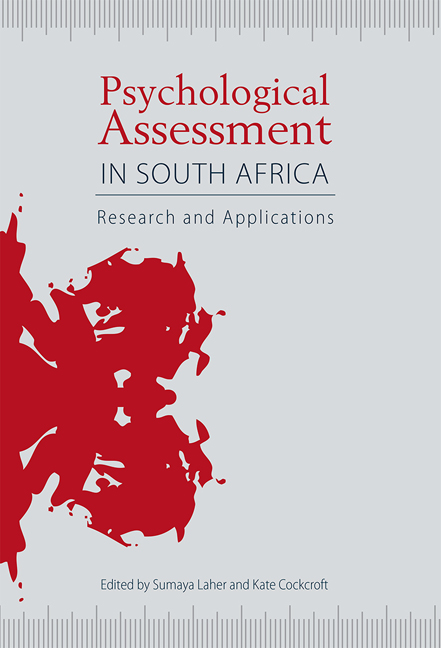Book contents
- Frontmatter
- Contents
- Tables and figures
- Acknowledgements
- Acronyms and abbreviations
- 1 Contextualising psychological assessment in South Africa
- Section One Cognitive tests: conceptual and practical applications
- 2 WAIS-III test performance in the South African context: extension of a prior cross-cultural normative database
- 3 WISC-IV test performance in the South African context: a collation of cross-cultural norms
- 4 The Senior South African Individual Scales – Revised: a review
- 5 Assessing school readiness using the Junior South African Individual Scales: a pathway to resilience
- 6 School readiness assessment in South Africa
- 7 The Kaufman Assessment Battery in South Africa
- 8 The Das-Naglieri Cognitive Assessment System
- 9 Dynamic assessment in South Africa
- 10 The Learning Potential Computerised Adaptive Test in South Africa
- 11 APIL and TRAM learning potential assessment instruments
- 12 The Griffiths Mental Development Scales: an overview and a consideration of their relevance for South Africa
- 13 Neuropsychological assessment in South Africa
- Section Two Personality and projective tests: conceptual and practical applications
- Section Three Assessment approaches and methodologies
- Contributors
- Index
12 - The Griffiths Mental Development Scales: an overview and a consideration of their relevance for South Africa
from Section One - Cognitive tests: conceptual and practical applications
Published online by Cambridge University Press: 21 April 2018
- Frontmatter
- Contents
- Tables and figures
- Acknowledgements
- Acronyms and abbreviations
- 1 Contextualising psychological assessment in South Africa
- Section One Cognitive tests: conceptual and practical applications
- 2 WAIS-III test performance in the South African context: extension of a prior cross-cultural normative database
- 3 WISC-IV test performance in the South African context: a collation of cross-cultural norms
- 4 The Senior South African Individual Scales – Revised: a review
- 5 Assessing school readiness using the Junior South African Individual Scales: a pathway to resilience
- 6 School readiness assessment in South Africa
- 7 The Kaufman Assessment Battery in South Africa
- 8 The Das-Naglieri Cognitive Assessment System
- 9 Dynamic assessment in South Africa
- 10 The Learning Potential Computerised Adaptive Test in South Africa
- 11 APIL and TRAM learning potential assessment instruments
- 12 The Griffiths Mental Development Scales: an overview and a consideration of their relevance for South Africa
- 13 Neuropsychological assessment in South Africa
- Section Two Personality and projective tests: conceptual and practical applications
- Section Three Assessment approaches and methodologies
- Contributors
- Index
Summary
The Griffiths Mental Development Scales (GMDS) is one of a variety of tests available for assessing the development of young children. It consists of two separate developmental scales, one scale for infants and toddlers (aged 0–2 years) and the other for young children (aged 2–8 years), making it one of the few developmental tests that can be used to assess children from birth across all areas of their development.
The GMDS was developed in the UK in 1954 by Ruth Griffiths, who observed children in their natural environments while they were engaged in their everyday activities. Griffiths's purpose was to develop an instrument that contained a comparative profile of abilities across various domains of development, and which would facilitate early diagnosis of deficits in child development. Although standardised in the UK, the GMDS is widely used throughout the world and is especially popular in South Africa (Luiz, Oelofsen, Stewart & Michell, 1995).
In South Africa, testing and assessment have been heavily criticised as possessing limited value for culturally diverse populations (Foxcroft, 1997; Nzimande, 1995; Sehlapelo & Terre Blanche, 1996). Despite these criticisms, it has also been pointed out that, regardless of its flaws, testing remains more reliable and valid than any of the limited number of alternatives. It is argued that since testing plays a crucial role within assessment internationally, the focus should be on valid and reliable tests for use within multicultural and multilingual societies (Plug in Foxcroft, 1997). Thus, one of the aims of this chapter is to determine the extent to which the GMDS is a valid and reliable measure for assessing the development of South African children.
The original GMDS has been extensively researched and compared to other commonly used developmental tests and shown to be valid (Luiz, Foxcroft & Stewart, 2001). Subsequent to the revision of the GMDS Infant Scales in 1996 and the Extended Scales for older children in 2004, research emerged that assessed the strengths and weaknesses of the revised scales, much of which has been done in South Africa (for example, Laughton et al., 2010b; Luiz, Foxcroft & Povey, 2006). What follows is an overview of this research, preceded by a brief description of the GMDS.
- Type
- Chapter
- Information
- Psychological Assessment in South AfricaResearch and Applications, pp. 169 - 185Publisher: Wits University PressPrint publication year: 2013



